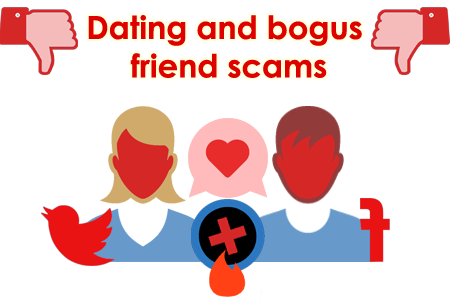Online and Bogus Friend Scams
Dating and bogus friend scams- A play on your emotional triggers:
Emotional killers trick you thorough their false love:
Here is your grammatically corrected version with improved clarity and no line breaks:
These scammers approach you through online dating websites; sometimes, they even use email or social media with fake profiles that always contain attractive pictures and personal information stolen from legitimate individuals. Within a short period of time, they build a relationship with you by expressing strong emotions. They pretend to have undying love for you and often send gifts, greeting cards, and poetry to make you fall under their spell and get victimized in bogus letter scams. Once they gain your trust, romance scammers slowly reveal their true intentions by asking for cash, credit card details, or other personal information.
These criminals always ask for money, citing sentimental reasons that seem unavoidable. The most common scenarios include asking for money to treat an ill family member who needs urgent, expensive surgery, or to fund higher education. Some dating and bogus friend scams involve requests for money to rebuild a failed business that often doesn't exist. Scammers who claim to be working overseas ask victims to send money for flight tickets, claiming they are eager to meet—but they never accept direct airfare bookings, as their goal is to rip off money, not to visit.
Emotional killers are adept at deceiving under the guise of false love. They weave intricate narratives of affection, understanding, and support to create a façade of genuine connection. These manipulators prey on the emotional vulnerabilities of their targets, exploiting the natural human desire for love and companionship. Their tactics involve swift professions of love, intense emotional bonding, and the promise of unwavering support. However, behind this veneer lies a calculated agenda, often driven by financial gain or other malicious motives. Victims of emotional killers find themselves ensnared in a web of deceit, as the counterfeit love is revealed to be a tool for manipulation and exploitation. Recognizing the signs of these emotional killers is essential for safeguarding one's emotional well-being and avoiding the devastating consequences of deceptive relationships.
Identities of dating and bogus friend scams:
Scammers will reach out to you on dating websites, and once you start communicating with them, they will gradually move you away from the platform and insist on contacting them only through personal chat or email. They may claim to be living overseas and to have graduated from prestigious American institutions, but their English will often be poor, and their messages will contain numerous spelling and grammatical errors. They tend to show inconsistencies in their social media profiles, such as frequently changing pictures, addresses, and personal information. They will avoid direct meetings and prefer to keep the relationship secret. If you experience any of the above behaviors, it is wise to distance yourself from such individuals, as you are likely dealing with cunning scammers.
In dating and bogus friend scams, identities are shrouded in deception. Perpetrators assume false personas, creating captivating profiles with fabricated details and stolen images. These fictitious identities are meticulously crafted to lure unsuspecting individuals seeking genuine connections. In dating scams, the false identity often involves feigned romantic interest, leading to emotional manipulation and financial exploitation. Bogus friend scams use similar tactics, with scammers posing as trustworthy companions to exploit victims emotionally and financially. The anonymity provided by online platforms allows these perpetrators to conceal their true intentions behind a façade of friendship or romance. Recognizing the signs of deceptive identities—such as reluctance to meet in person or requests for financial assistance—is crucial for protecting yourself from falling victim to these elaborate scams.
Be mentally strong to fight against dating and bogus friend scams:
Con artists always target individuals who are emotionally vulnerable, so prepare your mind in such a way that you have a strong handle on your emotions. Never allow a third person to intervene in your decision-making abilities. If you meet a companion on a dating or social website, ensure that you keep the relationship transparent to everyone. Giving money upfront to a stranger will always leave you in vain, robbing you of your peace of mind and emotional well-being. Be cautious when accepting friend requests on social networks, and never accept immediate proposals that come after just two or three days of chatting. Above all, personal awareness about dating and bogus scammer websites is the strongest barrier between you and these scams. So stay informed and protect yourself from these unscrupulous scammers.
Being mentally strong is paramount in combating dating and bogus friend scams. These scams often exploit emotions, playing on the human desire for connection and companionship. To resist these manipulative tactics, one must cultivate resilience and self-awareness. Mental strength involves maintaining a healthy skepticism, questioning inconsistencies, and staying alert to red flags such as reluctance to meet in person or repeated financial requests. Establishing and enforcing personal boundaries is essential, ensuring that emotional vulnerability is not easily exploited. Seek support from trusted friends or family members for perspective and guidance. Remember, mental strength empowers individuals to recognize deceit, protect their emotional well-being, and break free from the web of manipulation spun by those seeking to exploit trust in dating and friendship-based scams.


